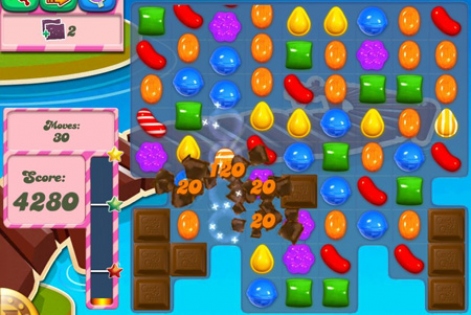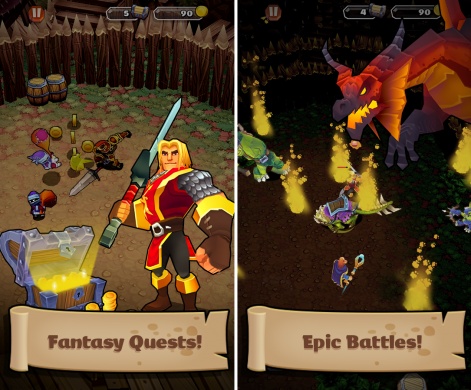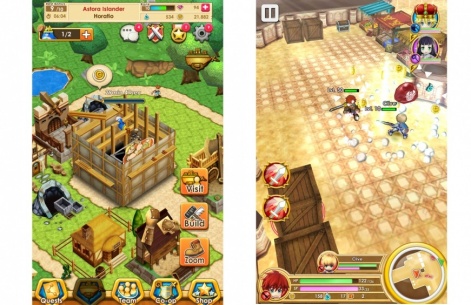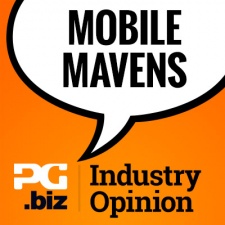A significant piece of recent news that's flown under many people's radar is that King, the Activision Blizzard-owned casual gaming experts behind Candy Crush, have soft-launched a midcore RPG called Hero.
It's a big move for the firm, whose only significant departure from match-3 puzzling thus far has been the casual resource management game Paradise Bay.
As such, we asked our Mobile Mavens:
- Given its success in casual gaming, do you think King can also be successful in midcore?
- Additionally, as it's still a term with no solid definition, what does 'midcore' mean anyway?
I believe King can be successful in any free-to-play segment and I believe this is one reason Activision acquired them. Hardcore triple-A games will evolve to F2P overtime. Conversion of players to paying is critical.
King has some of the highest percentages of paying players in F2P games. Hero looks good and I’m sure King has done a great deal of testing and refinement, as they have done on their more casual games.

Adam has been in the mobile game industry since 2007, creating games independently. He's since grown into a full 50+ person studio manager.
Recently he's taken a position at Wooga in Berlin to sharpen his design skills and work with the world's best to create amazing, well-crafted products onto the mobile marketplace.
Big fans of the guys from Nonstop games, and looking forward to playing through Hero!
[NB: It has since been suggested, albeit from unofficial and unconfirmed sources, that Hero is being developed by King's Spanish studio, not Nonstop.]
King has a leg up compared to most midcore studios in that they have a massive audience they can leverage and cross-promote within.
It's obvious that the whole audience of Candy Crush will not want to play Hero, however it's naive to assume that these audiences are mutually exclusive. There will be some power in cross-promoting to their Saga audience.

There are players of Candy Crush that also play RPG games and would be happy to try a new one. This cross-promotion will help lower the CPI costs that traditionally impede RPG games.
King also has talented design teams internally that have the ability to create strong titles outside match 3. I think it is smart for King to diversify from its Saga portfolio to ensure that it can innovate and grow for the years to come.
Going into the definition of midcore is opening an endless debate.
Going into the definition of midcore is opening an endless debate.Adam Telfer
My take: midcore is a terrible label. Assuming the mobile audience can fit in three buckets (casual, midcore, core) is lazy.
I agree with using core and casual when it comes to segmenting your own game's audience. In a game like Candy Crush, you have your core audience which will be hyper-engaged, play lots of sessions, and breeze through content.
Then you have your casual audience, which will play fewer sessions per day and will take considerably longer.
Designing and balancing for both types of players is key to pacing your content properly and ensuring that multiple playing styles are possible and fun within your game.
Using core and casual to define the entire market is lazy. The market is built upon millions of players that all have different interests and experiences in gaming.
To properly define your audience for a game you have to do proper user research: get hard numbers of what your audience desires and even talk to players directly.
Don't assume that labels like 'midcore' are a substitute for actually knowing your game's audience.
The question if King can be successful in midcore can be split up into 2 parts: can they design a working midcore title, and can they market one? The answer to both is likely to be yes.
I believe that they have the talent in-house to build a successful game for this genre. It is not what they have been doing in the company lately, of course, but I think they understand it well.

Large parts of it will, deep down, be based on similar principles. Human psychology is what it is, no matter the genre.
For marketing, it is likely that their cross promotion power will be limited when examined from a percentage perspective. Candy Crush Saga players in general are unlikely to become big fans of Hero.
Candy Crush Saga players in general are unlikely to become big fans of Hero, but that can be made up for by raw numbers.Torulf Jernström
They can more than make up for that in raw numbers, however. If they decide to cross promote (they might very well decide not to), their fan base is so large that there is bound to be some people who are interested - just like Adam points out.
They will also have some of the best contacts with the platform holders in the industry, as well as one of the largest war chests for paid UA to push the game if it has a good LTV.
Midcore in general is likely most useful in discussions like this. It's not a target to aim for when designing a game.
It is a shorthand for giving other game developers a quick, rough idea about what sort of game you are discussing. Personally, I translate it to: "something that involves a lot of strategy, while still trying to be approachable instead of confusing the hell out of people."
The Supercell games are therefore midcore, while the Machine Zone stuff is not.

A games programmer before joining Sony’s early PlayStation team in 1994, he then founded developer Pure Entertainment, which IPO’d and launched a free-to-play online gaming service way back in 1999.
He was also a director of pioneering motion gaming startup In2Games, which was sold to a US group in 2008.
Along the way, he’s been a corporate VP, troubleshooter, and non-exec to a variety of companies and investors in and around the games sector.
Harry was European CEO of Marvelous AQL, a Japanese developer and publisher of social, mobile and console games, known for console games like No More Heroes and Harvest Moon, but now highly successful in the free-to-play mobile and web space in Japan and Asia.
Harry is CEO of Magicave.
I haven't had a chance to play Hero yet, but it looks nice and I have massive respect for King's ability to drive success, so it has to be in with a chance.
Regarding midcore - it's not a phrase I ever use, mainly because it sounds kind of disparaging, like the MOR [middle of the road] of games.
Midcore is not a phrase I use, because it sounds disparaging.Harry Holmwood
I don't like it because it positions a game between hardcore (for 'proper gamers') and casual (for 'everyone else').
I don't believe that a deep and engrossing, sophisticated game is necessarily dumbed down just because it also has a great UI that doesn't confuse the hell out of people.
When I started making games, 'strategy' meant a hex-based wargame that hardly anyone could understand. The RTS genre came along and brought that depth to a much wider audience.
I agree with what Torulf says - probably 'midcore' means accessible games with a lot of depth. Which means we at The Secret Police are making a midcore game. But don't tell anyone.
In my previous job at gumi we used to define midcore games as aiming for over $0.30-40 gross ARPDAU.
Core would be over $0.7-0.9. I guess that's as good a definition as any?
Regardless, of course King's marketing power and incredible development talent give them a good chance of success in midcore. Hero was developed in Barcelona as far as I understand.

I personally doubt it will do well enough for King since Colopl's Rune Story didn't (in Western countries).
I wouldn't discard how hard it is to be successful at several genres at the same time.Nicolas Godement
However, as Adam mentioned, the team at Nonstop Games in Singapore does have a very strong track-record and even higher potential so whatever they come up with will be one to watch.
With that said, I wouldn't discard how hard it is to be successful at several genres at the same time on mobile. EA and Tencent do it, Supercell does it now with Clash Royale, but King, Machine Zone and most Asian publishers are essentially mono-genre.
It's easier for AAA retail publishers as marketing and distribution leverage will essentially sell any game.
It's much harder in mobile where all the distribution in the world won't help a game retain and monetize, which nudges the success factors farther from marketing and closer the capability and experience of the development team.
About a year ago I would have more seriously doubted King's ability to be successful in midcore, and in general to dip its toes into different genres of games.
Their first foray into a Hay Day/Castleville style game, Paradise Bay, did not make much noise in the U.S. top grossing charts. It had about 3 months within the top 100 grossing, but is now well outside of that.
It's very, very difficult to create hit games in multiple genres, and Supercell is one of the few developers that has been able to do so.
Mergers and acquisitions, however, are a great way to essentially buy a core competency.
This is what Activision-Blizzard did with King in acquiring a huge casual user-base and a proven track record of creating top grossing casual games, and this is what Zynga did with NaturalMotion in creating beautiful high-fidelity games like CSR Racing and Dawn of Titans.
The acquisition synergies are there - the marriage of Activision-Blizzard and King creates a powerhouse with multi-genre hit-generating capability.
The lack of significant overlap in the user-bases of Activision-Blizzard and King games could allow Hero to bridge the gap between casual and core.Devin Nambiar
Whether or not cross-promotion efforts actually gain traction, the fact that King has several userbases to cross-promo to, as well as behavioral data to refine its cross-promo targeting make it a huge opportunity.
Moreover, the lack of significant overlap in the user-bases of Activision-Blizzard and King games could allow King to use their midcore game to essentially "bridge the gap" between casual and core user-bases, and in fact this seems like a natural strategic move to leverage both of their user-bases at the same time.
However, this theory depends on what your definition of 'midcore' actually is...
Segueing into the mid-core discussion, it's inherently a label that presupposes casual and hardcore genres are its bookends and that it sits somewhere in between.
I agree with other responders here, however, that putting the whole market into three buckets is lazy, and I'd maintain that the core compulsions of users within even a single game exist on a continuous spectrum.
Game of War, for example, probably is comprised of mid-core and core players, however it's going to be hard for a player on the more casual end of the spectrum to advance too far without heavy investment in their alliance and alliance-based gameplay.
If you really wanted to segment the entire market into core, midcore, and casual, you could probably categorise midcore as games with deep strategic elements in the single-player experience, but which may not necessarily incorporate a large and immediate alliance experience into the gameplay - think Summoners War or Marvel: Contest of Champions.
A midcore game probably still has a fairly wide funnel, but also does not overwhelm the player with deep gameplay in the early game; the possibility exists in the elder game to create a more 'core' user.
That said, the more I try to define what this is, the more I'm inclined to throw out the label entirely.

























